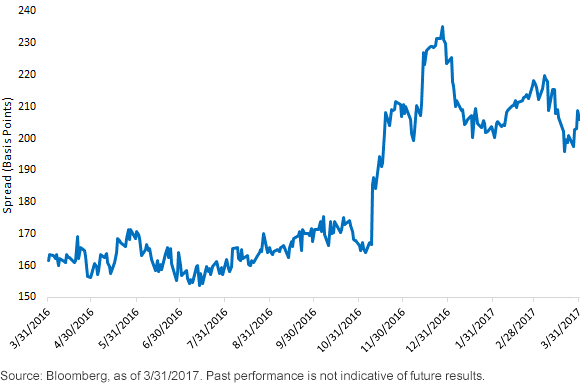
By Kevin Flanagan, WisdomTree Investments
Special to the Financial Independence Hub
Do global bond yields matter anymore? Following the results of Election Day and the subsequent response in the U.S. bond market, this was certainly a valid question. Indeed, with U.S. Treasury (UST) yields ascending rather visibly, a key investment force (relative yield advantage vs. the rest of the G7 universe) that had helped keep UST yields in check, if not push them even lower, seemed to fall off the fixed-income radar.
With the first quarter of 2017 now in the books, and the markets almost five months removed from the U.S. election, we thought it would be useful to provide some insight as to where the UST 10-Year yield resides now, and consider whether the relative yield advantage still exists.
While it has not always been a one-way street to the upside, G7 10-year yields have all risen to varying degrees, with the one notable exception being the UK, where gilts have actually seen a decline of 6 basis points (bps) since November 7. Italian 10-year yields fall on the other end of the spectrum, as the 10-year has experienced an increase of 61 bps, while the gain in France has been pegged at 50 bps. To put this in some additional perspective, the rise in the UST 10-Year was +56 bps. Rounding out the 10-year yield tallies: Canada +41 bps; Germany +18 bps and Japan +12 bps.
It should also be noted that the experience thus far in 2017 seems to have been a bit more country/region specific and not just the kind of broader move in global rates that investors have witnessed before. To be sure, here in the U.S., Treasury yields have been responding to developments in Washington D.C., such as the Fed pushing up its first rate hike three months earlier than expected and continued political headlines in the first few months of the Trump administration.
In France, Italy and Germany, sovereign debt markets have also been influenced by political headlines. They focus on the upcoming French presidential elections, as polls vacillating around the National Front candidate, Marine Le Pen, have created an environment where risk-off (Le Pen doing well in the polls) favors German bunds over French or Italian debt, and the opposite (Le Pen trailing in the polls) reverses the trade. Meanwhile, in the UK, the headlines and developments surrounding Brexit and the recent triggering of Article 50 of the Lisbon Treaty have no doubt factored into the equation.
Conclusion
So, back to the question we posed at the outset: Do global bond yields matter anymore, specifically as they relate to Treasuries? The varying rate of developments throughout the G7 sovereign debt universe over the last four to five months still leaves us with one important conclusion: The relative yield advantage remains in place, and in fact, in the case of key markets such as Germany, this advantage has only become greater.
The graph shown at the top of this blog clearly illustrates this point. Following the initial post-election/post-December FOMC rate hike surge, the spread between 10-Year Treasuries and 10-year bunds did narrow roughly 35 bps from its peak, but it is still more than 40 bps above the average for the period of March 31 of last year through Election Day.
Given the divergent paths of monetary policy between the Fed, the European Central Bank (ECB) and the Bank of Japan (BOJ), we would expect this favorable yield advantage to continue. However, as we have witnessed firsthand over the last four to five months, this factor alone will not necessarily prevent Treasury yields from rising.
Unless otherwise noted, source is Bloomberg, as of 3/31/2017.
 Kevin Flanagan is WisdomTree Investments’ Senior Fixed Income Strategist. In this role, he contributes to the asset allocation team, writes fixed income-related content and travels with the sales team, conducting client-facing meetings and providing expertise on WisdomTree’s existing and future bond ETFs. In addition, Kevin works closely with the fixed income team. Prior to joining WisdomTree, Kevin spent 30 years at Morgan Stanley, where he was most recently a Managing Director. Kevin has an MBA from Pace University’s Lubin Graduate School of Business, and a B.S in Finance from Fairfield University.
Kevin Flanagan is WisdomTree Investments’ Senior Fixed Income Strategist. In this role, he contributes to the asset allocation team, writes fixed income-related content and travels with the sales team, conducting client-facing meetings and providing expertise on WisdomTree’s existing and future bond ETFs. In addition, Kevin works closely with the fixed income team. Prior to joining WisdomTree, Kevin spent 30 years at Morgan Stanley, where he was most recently a Managing Director. Kevin has an MBA from Pace University’s Lubin Graduate School of Business, and a B.S in Finance from Fairfield University.
Important Risks Related to this Article Fixed income investments are subject to interest rate risk; their value will normally decline as interest rates rise. In addition, when interest rates fall, income may decline. Fixed income investments are also subject to credit risk, the risk that the issuer of a bond will fail to pay interest and principal in a timely manner or that negative perceptions of the issuer’s ability to make such payments will cause the price of that bond to decline. Disclosure Commissions, management fees and expenses all may be associated with investing in WisdomTree ETFs. Please read the relevant prospectus before investing. WisdomTree ETFs are not guaranteed, their values change frequently and past performance may not be repeated. Past performance is not indicative of future results. This material contains the opinions of the author, which are subject to change, and should not to be considered or interpreted as a recommendation to participate in any particular trading strategy, or deemed to be an offer or sale of any investment product and it should not be relied on as such. There is no guarantee that any strategies discussed will work under all market conditions. This material represents an assessment of the market environment at a specific time and is not intended to be a forecast of future events or a guarantee of future results. This material should not be relied upon as research or investment advice regarding any security in particular. The user of this information assumes the entire risk of any use made of the information provided herein. Neither WisdomTree nor its affiliates provide tax or legal advice. Investors seeking tax or legal advice should consult their tax or legal advisor. Unless expressly stated otherwise the opinions, interpretations or findings expressed herein do not necessarily represent the views of WisdomTree or any of its affiliates. “WisdomTree” is a marketing name used by WisdomTree Investments, Inc. and its affiliates globally. WisdomTree Asset Management Canada, Inc., a wholly-owned subsidiary of WisdomTree Investments, Inc., is the manager and trustee of the WisdomTree ETFs listed for trading on the Toronto Stock Exchange.



